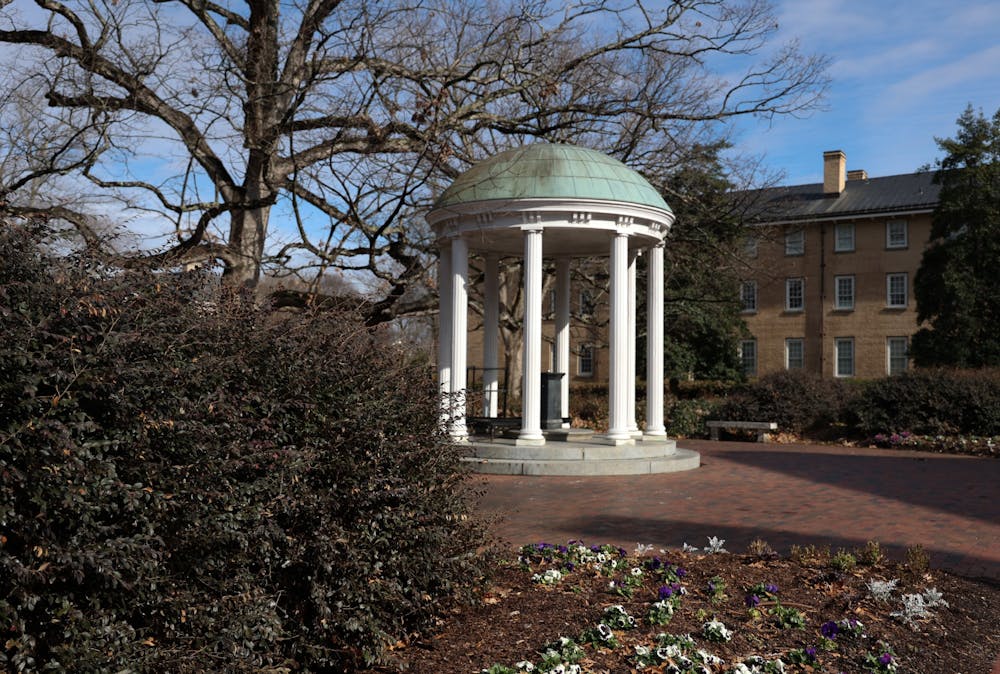The Faculty Executive Committee discussed the announcement of a new School of Civic Life and Leadership, along with a resolution on compelled speech proposed by the UNC System’s Board of Governors, in their meeting on Monday.
The committee also spoke on work-related data principles and the University’s formation of a committee for academic freedom and free expression.
Here’s the rundown:
- Members of the committee held a question and answer session with Provost Chris Clemens and Chancellor Kevin Guskiewicz about a resolution passed by UNC’s Board of Trustees to form a new School of Civic Life and Leadership.
- Plans for the school were discussed in a Jan. 26 Wall Street Journal editorial. Chairperson of the BOT David Boliek also discussed the creation of the school on Fox and Friends on Jan. 28.
- Some faculty members felt blindsided by the proposal and worried about representations of the new school in the media.
- Clemens and Guskiewicz said that the new school would expand upon the IDEAs in Action curriculum and contain the Program for Public Discourse.
- “Our vision is not about making a political statement," Clemens said. "It is about fully realizing the vision of IDEAs in Action, about creating a school that will focus on preparing our students with the skills and capacities to make democracy work better. Speaking, listening, and arguing together."
- The BOT passed the resolution from the floor last Thursday. Clemens said he and James White, dean of the College of Arts and Sciences — the college that the school will reside in — had not submitted an official budget request.
- Clemens and Guskiewicz said that the school is in its infancy and planning will involve faculty throughout.
- Chairperson of the Faculty Mimi Chapman expressed concerns over whether a new school was needed. She said that many faculty on campus were already teaching civil discourse in their classrooms.
- “To me, this is a solution in search of a problem, and the way it is happening and the content of what is happening is deeply, deeply troubling,” she said.
- The faculty were not notified of a plan for the School of Civic Life and Leadership.
- “I wonder if it may be that the main, or, a problem we’re dealing with is simply, and I want to say this with respect, that the Board of Trustees got out in front in a way that has done some considerable damage unintentionally,” Beth Mayer-Davis, professor of nutrition and dean of UNC's Graduate School, said.
- The committee also discussed an amendment to a BOG policy on employee political activities that would potentially ban questions about "certain ideals, missions, political issues or principles" in employment and enrollment processes.
- Chapman expressed concern over the “vague” language proposed by the BOG.
- Rumay Alexander, a professor in the School of Nursing, worried that the language might be aimed at reducing diversity, equity and inclusion practices in the UNC System.
- “What I want us to be aware of is that people are connecting dots; they’re not separate,” she said.
- Eric Muller, a professor in the UNC School of Law, raised concern over how the proposal might oppose the First Amendment and agreed with Chapman’s concern over vague language.
- “This is a First Amendment lawsuit waiting to happen, and I think it would be very, very unwise for the University to bring that on itself,” he said.
- The committee voted on a statement outlining their response to the proposal.
- Christian Lundberg, the vice provost for communication, outlined the goals of a new committee on academic freedom and free expression, appointed by Guskiewicz.
- “The committee is set up to do some research on the existing norms, legislation and policies and more than a regulatory question, we want to ask the question: what does it look like to create a thriving culture of free expression and academic freedom at UNC?” he said.
- A draft resolution that lays out the principles of appropriate faculty data usage was presented by Daniel Anderson, professor of English and comparative literature and chairperson of the Faculty Information Technology Advisory Committee.
- Anderson asked members of the committee for ideas and feedback concerning the following principles:
- Transparency; prohibiting surveillance; privacy and speech protection and promoting education
- Anderson asked members of the committee for ideas and feedback concerning the following principles:
What’s next:
The FEC will meet again on Monday, Feb. 6 from 3:00 p.m. to 5:00 p.m.




